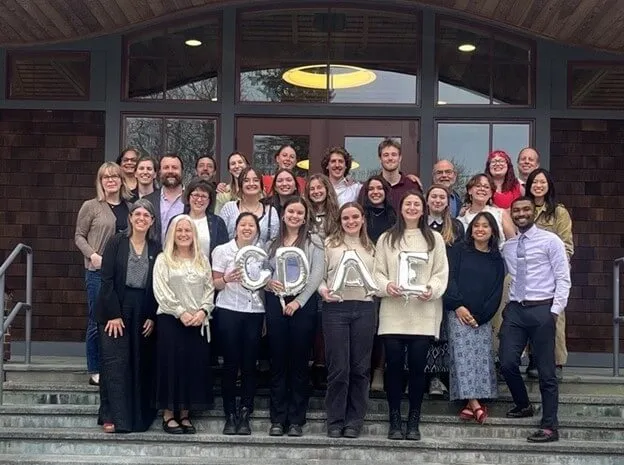CDAE Provides a Well-Rounded Education for Alumni Change-Makers
UVM’s Department of Community Development and Applied Economics (CDAE), has empowered thousands of students with interdisciplinary education crossing design, entrepreneurship, communication and community development to support Vermont and global communities.
This work is reflected in how community is built within the department itself. CDAE Chair Jason Konefal is strengthening this focus through developing more ties between students, faculty, and alumni.
"We've tried to have more events that bring students and faculty together," said Dr. Konefal, who began his leadership role in August. "This year is kind of a test case to get a sense of what works and what doesn't work, what students are interested in, what kind of events they like, and what they don't have interest in attending," explained Konefal. Community events such as those focused on cider and donuts, a Halloween-themed celebration, and Town Meeting Day, sharing Cocoa and Cookies during study sessions have all been part of this process.
Konefal is also bringing CDAE alumni back to campus and incorporating them into these events and the classroom. "Having successful alumni demonstrates to students different career paths," he explained. "It helps students understand their career paths, and they can visualize what it looks like, from graduating and getting your degree to getting the kind of job you want."
Sharing such stories illustrates how CDAE alums have thrived beyond graduation and how the department set them up for success.
Senior Lecturer and Assistant Chair of the CDAE Department Thomas DeSisto has seen similar success in current and past CDAE students who benefit from the department’s well-rounded education in various disciplines.
"I think it's good to focus on certain areas and know how to use certain tools, but being more general and having a broad understanding of things allows you to slot yourself into a lot of different careers," explained DeSisto.
When discussing what past students are doing now, he explained it is often tricky even to know their major.
"Was it design? Was it communication? Was it entrepreneurship? Was it international development?" said DeSisto. "I think of one student who graduated two years ago, she has her own design business, so she has an entrepreneurial and design focus. She also works full-time as a communication coordinator for a hospital in Boston, so she's in communication. She's really focused on how these messages impact the community, so she also has this interesting community international development focus."
DeSisto also thinks CDAE's students are all dedicated to bettering the lives of people around them, an observation shared by CDAE Professor Anaka Aiyar.
"I'm always amazed by the CDAE students I interact with and how passionate they are about the communities they work with," explained Professor Aiyar. "They think it's very important to focus their energy and efforts to improve the systems and the communities they're part of. And that's a very unique CDAE student ethos I see."
Aiyar believes bringing more CDAE alumni to campus would showcase the program's uniqueness and give alums a chance to discuss what it means to have a CDAE degree in the world.
Indeed, CDAE faculty look forward to expanding alumni outreach in coming years. David Conner, a CDAE alum and now professor in the department, has seen the program increase in popularity in recent years, but with its core values remaining the same.
"We were always early adopters of transdisciplinary social science research, highly engaged scholarship, and lots of service learning," explained Professor Conner. "That was all there when I arrived as a faculty member." Such a focus continues to empower students with the skills and experience to hit the ground running after they graduate to make the world a better place.
